You may have noticed that before and/or after your kitten or cat eats or drinks, it will paw, scratch, or knead the floor as if digging or burying something. This is not unusual behavior, and rest assured there is nothing wrong with your cat. In fact, your pet is demonstrating an instinct shared even by big game cats, and it is a very positive sign that it is feeling at home in your house.
However, if you find the behavior annoying or disruptive, you can take simple steps to change it.
Why Your Cat Scratches at the Floor
Many cats will scratch, paw, or knead the ground around their food bowl before or after eating. The scratchingand digging is an example of instinctive behavior, meaning your cat probably didn't learn it from its mother. Some cats may take this behavior to an extreme, spending a good deal of time scratching at the floor or kneading the carpet around their food bowl. In some cases, cats will also drag objects such as towels on top of their food bowls.
Caching, Protecting, or Disposing of Food
In the wild, feral cats often bury their food remains (as well as their feces) as a protective measure so their enemies can't track them: buried food has little smell and does not attract scavengers or predators. If they are females still nursing their kittens, they will do so to help prevent other cats from finding their litter. Similarly, unneutered male cats will also spray their territory with urine as a warning to other predators to stay away. (Be sure to have your cat neutered at an appropriate age so he doesn't follow through with urine marking.)
Cats all over the world demonstrate this behavior. It is similar to "food caching," which is practiced by big game cats. The leopard is best known for food caching, which involves storing food high up in trees to keep away from lions and hyenas. The North American bobcat also exhibits this protective measure, covering the remains of its kill with debris to hide from other animals.
If you put newspapers under the food plates, you may notice your cat scratching under the plate, shredding the newspapers, and even piling them over the food bowl to hide it completely. This is another type of "food caching."
In some cases, cats will scratch at or bury food or other items they dislike. This behavior is similar to burying feces in a litter box or on the ground. Like caching, burying allows the cat to "disappear" by getting rid of its waste. In addition, as cats often sleep where they eat, burying waste can be a way of "tidying" a cat's personal space.
It may not seem to make sense that a house cat without any threat of their food being taken would exhibit this kind of behavior. And, it doesn't make sense, really, except for the fact that the behavior is instinctual and cats do it naturally.
Kneading the Floor
Kneading is a sign of contentment; when your cat kneads its paws, it may be anticipating a pleasant experience (such as eating a meal). Cats and kittens will knead one another by gently alternating their paws, much as a person might give another person a back rub. Kneading is more likely if the area surrounding the food bowl is soft (like carpet, for example).
How to Stop Your Cat from Scratching or Kneading Ground
Neither scratching nor kneading is, in itself, a harmful behavior. It can't hurt your cat, and it's unlikely to cause you any harm. In fact, some cat owners simply find it cute.
On the other hand, it can be annoying and can lead to a mess if your pet rips up papers or damages your carpet. If you feel the behavior is a problem, you can take a few steps to manage it.
- Place food on a hard surface away from items that can be damaged or dragged to cover the bowl.
- Stay with your pet as it eats, and remove the food bowl when it is finished eating. In general, it's best to put away wet food within a few minutes if it isn't entirely eaten, as it can easily spoil.
- If your cat begins to paw the floor, distract it with a toy or game.
- Avoid leaving dry cat food out for "free grazing" as this is likely to encourage scratching.
- Do not punish your cat for scratching or kneading, as it is a natural behavior and is not intrinsically harmful. Punishing your cat by spraying or hitting leads to more problematic behavior and can, in addition, make it harder for you and your pet to bond.
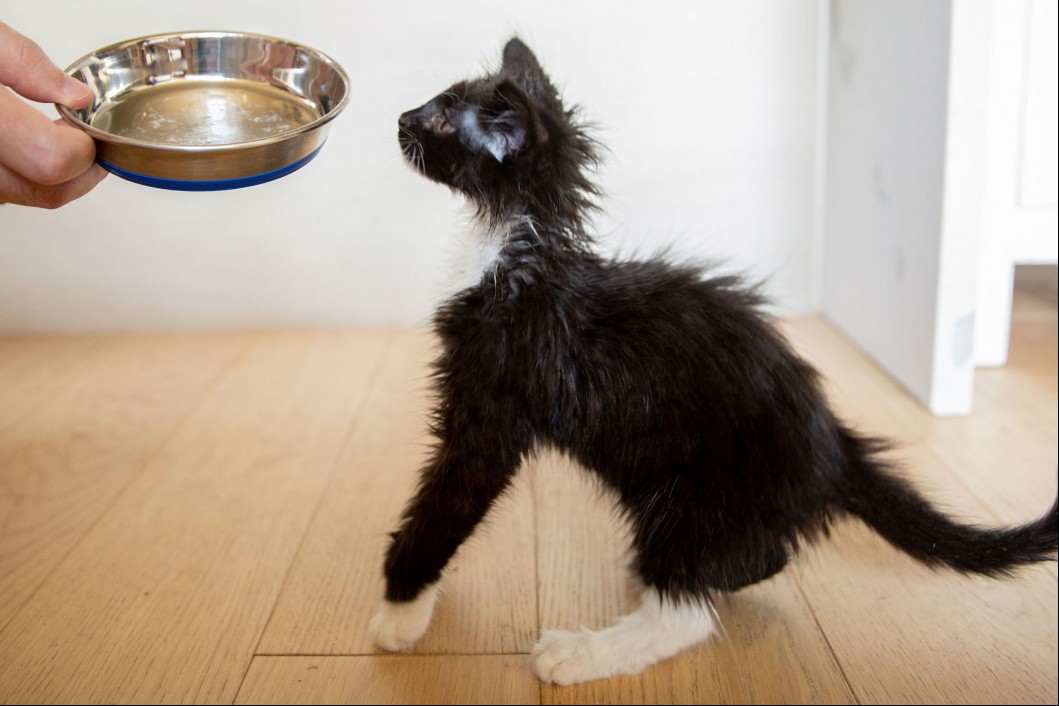
The Spruce / Phoebe Cheong
Related Article
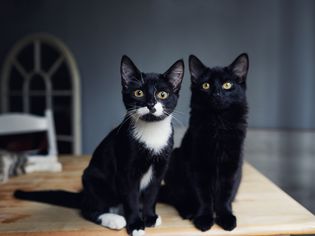
Why Do Cats Slap Each Other?
For a long time, cats have held a reputation for being solitary, and while they certainly aren'
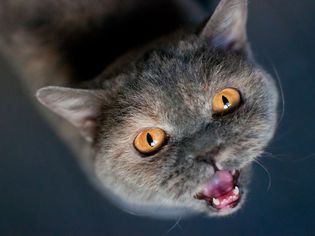
How to Stop Loud Meowing in Cats
As you probably already know, cats make a variety of noises. Some breeds, such as Siamese cats, are
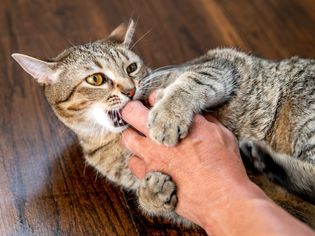
How to Stop Cats From Biting and Scratching
There are several basic kinds of aggression-based biting and scratching behaviors in cats, and some
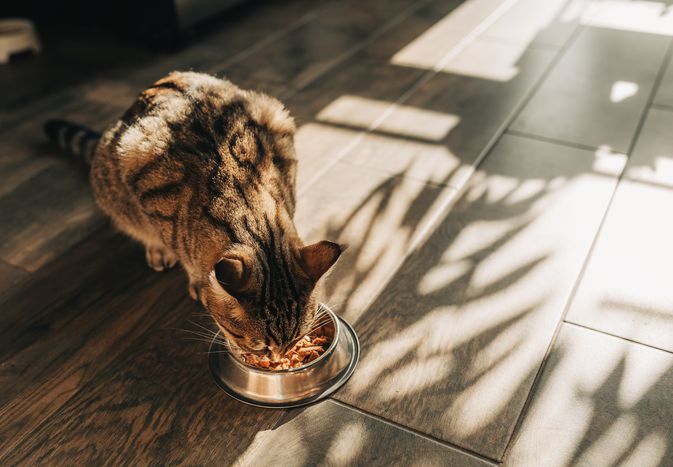
Can Cats Eat Sweet Potatoes? How to Safely Feed Your Cat This Root Vegetable
Sweet potatoes are a popular staple veggie in many households, especially during the fall, thanks t
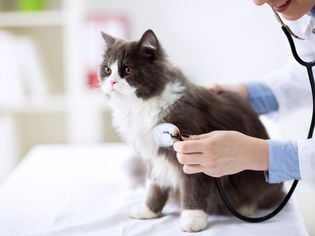
Toxoplasmosis in Cats
Toxoplasmosis (Toxoplasma gondii) is a single-celled parasite that infects many warm-blooded animal
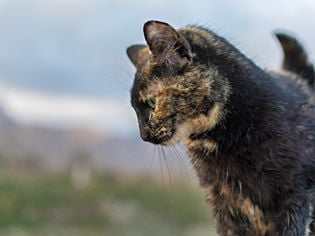
How to Treat Feline Leukemia
Any cat can contract feline leukemia by being exposed to the virus that causes it. It is easily spr
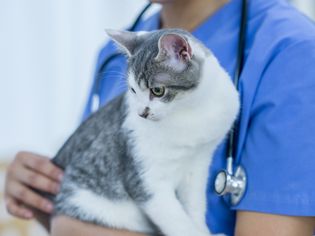
What Are Skin Tags on Cats?
Cats can get skin tags just like people do. Fortunately, most skin tags are nothing to worry about.
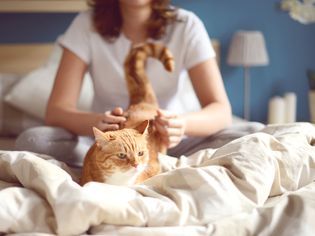
Feline Immunodeficiency Virus (FIV) in Cats
Feline immunodeficiency virus, or FIV, is a virus in the same family as the human immunodeficiency
About FleaFree Feline
We are a premier digital platform committed to delivering high-quality content to our readers. Our mission is to provide accurate, reliable, and engaging information that adds value to our audience's daily lives.
Our team consists of experienced content creators and subject matter experts who uphold the highest standards of professionalism. In an era of information overload, we curate content with care, ensuring our users receive only the most relevant and trustworthy information.
Beyond just reporting facts, we focus on depth and context. Through expert analysis, comprehensive research, and clear presentation, we help our audience gain meaningful insights and make informed decisions.
We take pride in being a trusted information source for our growing community of readers. Our user-first approach means we continuously adapt to provide content that meets our audience's evolving needs and interests.
Innovation and excellence drive everything we do. We're committed to improving our platform and services to deliver the best possible experience for our users.

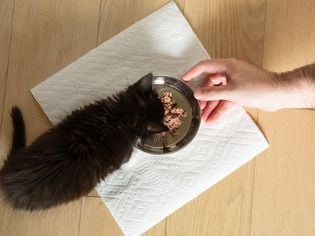
Comments on " Why Does My Cat Scratch the Floor After Eating?" :